”Ability is what you’re capable of doing. Motivation determines what you do. Attitude determines how well you do it”.
Lou Holtz (2021)
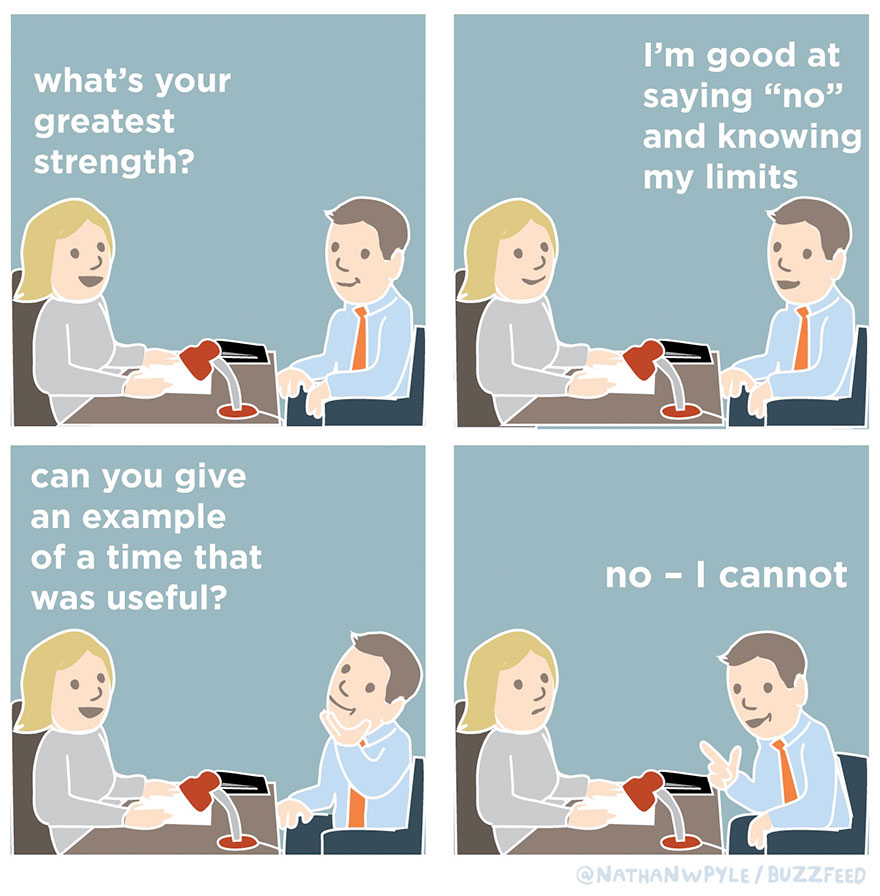
Interviews: a daunting experience that everyone has the misfortune of doing at some point in their lives. It’s a small window of time where your heart skips a beat or two while your mind races through all the important points you want to mention. All the while, you try to smile and make eye contact, so you don’t come across as a ball of nerves sitting before the interview panel. Recently, I participated in a simulated job interview for a university module, which has been great for experience and preparation as I step into the real world of job interviews. This blog post will present my experiences during my simulated interview in a reflective writing manner using Gibbs’ Reflective Model, showcasing my thoughts and feelings throughout the process.
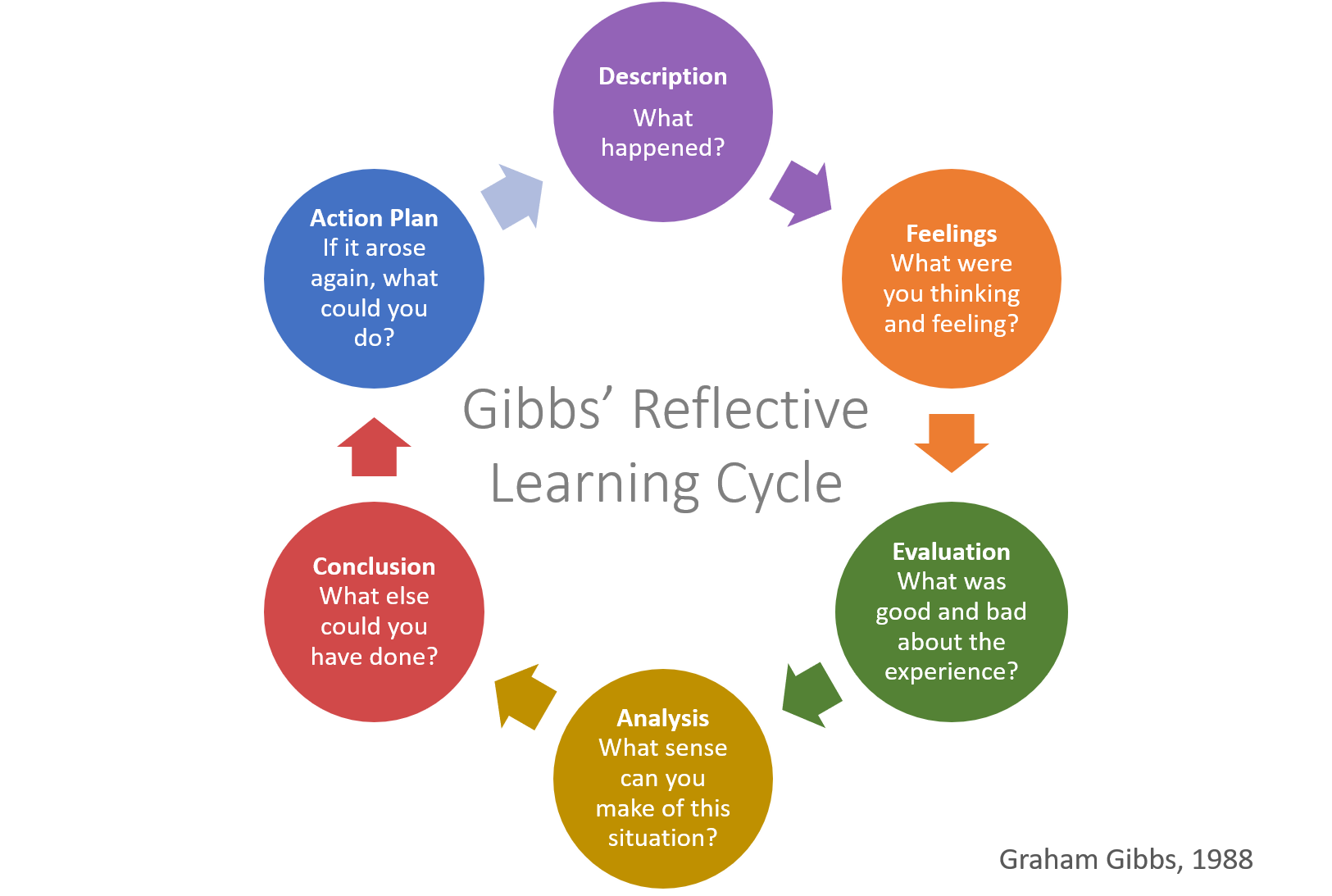
decisions, decisions…
When the time came to choose the job advert I would be applying for, I knew I was aiming to find something in the educational field. I always have had a passion for wanting to teach at Primary School level, so luckily I stumbled upon a Primary Teaching post in Down-Donaghadee Primary School. This suited me perfectly as I had also recently just completed two interviews for PGCE programmes and knew that I could apply my knowledge and research from those interviews to my simulated interview.
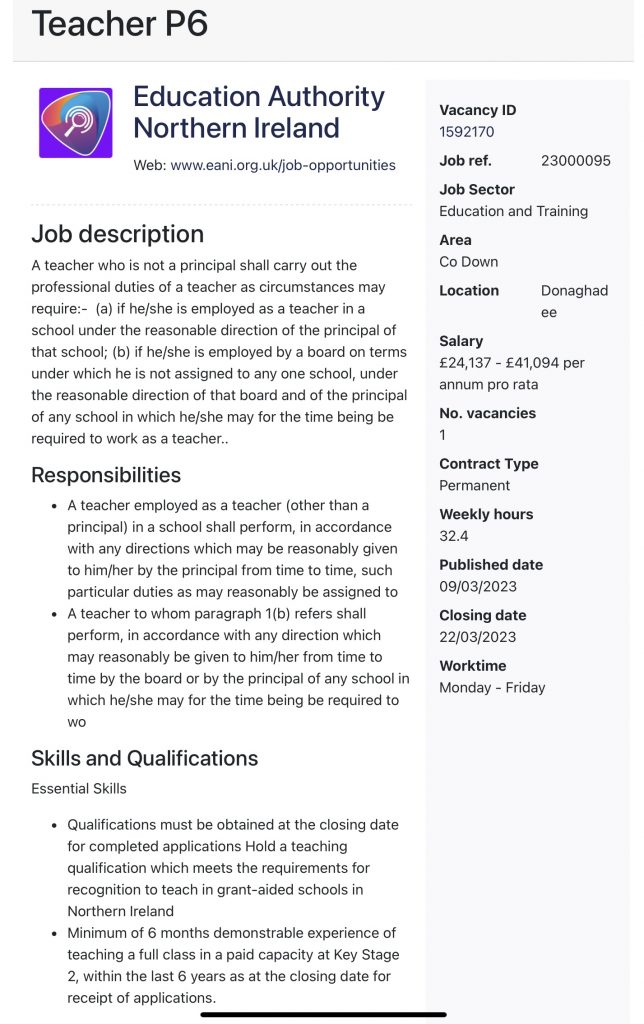
When reading about the skills and qualities expected of the applicants, I knew I had some more work to do. When it came to preparation, I drew on methods I had used in my previous interviews, such as creating mind maps of possible questions I could be asked on the day, key information about what was expected of me, and my previous experiences in the field. I took advice from Barclays’ article, which stated to “create a list of key skills, qualities and experience” (Barclays Life Skills, 2023), which I included in my mind map. As a visual learner, I find this method to be most effective as I could lay out all my research into different sections, so it appeared less scattered. This helped to put my mind at ease and feel more prepared stepping into the simulated interview experience.
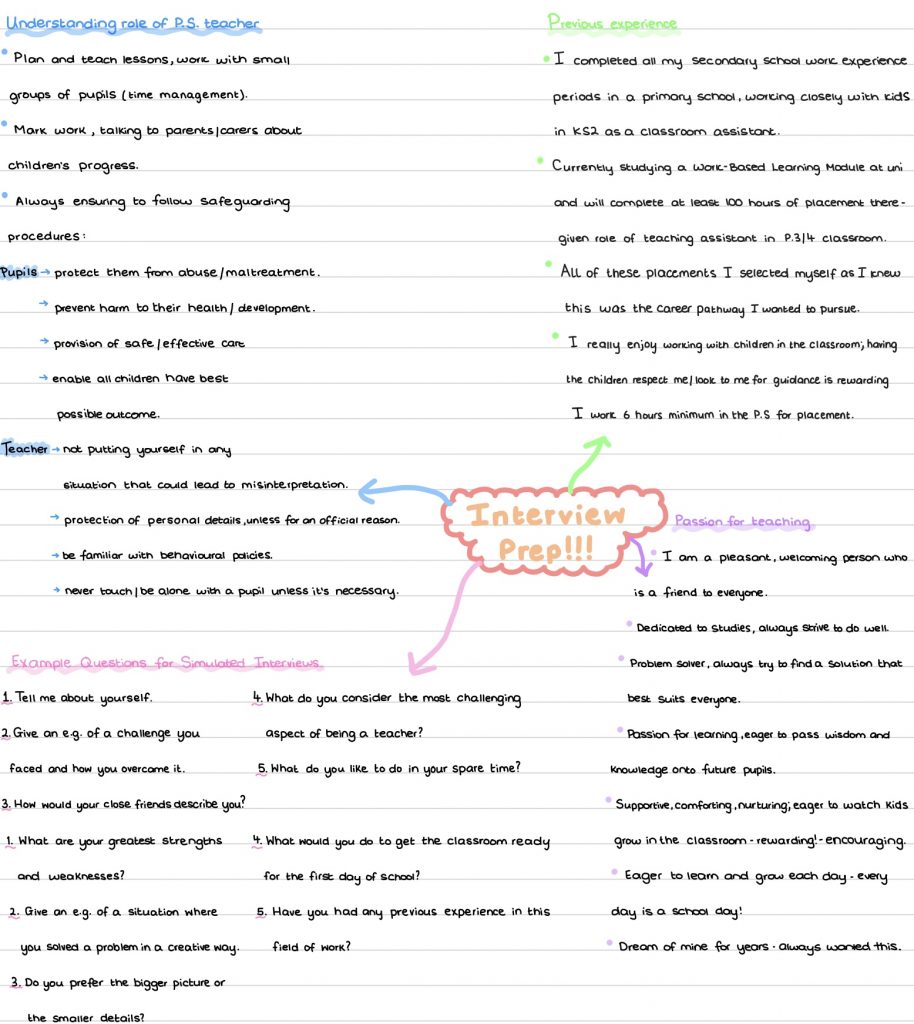
PLUCKING UP THE COURAGE
When I arrived for the simulated interviews, it appeared that I was the first one there. I feel that this is a good habit to instil as punctuality is important when it comes to interviews. It also gave me time to have a read through my notes before the process started. Given all the preparation and research I had gathered prior to my interview, I felt quite relaxed and comfortable enough to volunteer to be interviewed first, although I had a few butterflies fluttering in my stomach. Standing in the waiting area, I ran through all the points I wanted to include and tried to keep my composure. I recalled reading an article “Six ways to succeed in a teaching interview” by Buchanan during my research, “to be self-critical is, in my view, essential to high-performance and personal fulfilment” (Buchanan, 2017), which taught me not to be afraid to show my weaknesses and to just be authentic. As I approached my peers, I greeted them each with a smile and introduced myself. As the interview progressed, I felt more and more at ease as I answered each question with flying colours, ensuring to keep shifting eye contact between my peers. Everything was going swimmingly! That was until I hit a wall… one of my peers asked me the one question I hoped wouldn’t come up, “What would you say has been your biggest challenge so far?”.

don’t panic!
Despite being as prepared as I possibly could be, the dreaded brain fog began to form a cloud around me. This question always manages to stump me! A nervous laugh emerged from my body as my hands had accumulated a pool of sweat. I began to stress and a collection of “hmms” and “erms” became the basis of my vocabulary. I knew then I had to regain composure as to not alarm my interviewers. Thus, I reminded myself of the STAR technique we had discussed in class to formulate a sufficient answer. I started to recall a time where I found difficulty in the classroom where a child had snatched a marker from the other which resulted in them being upset. I explained how I resolved the issue by talking to the child individually, informing them of how this was wrong to do and to ask politely to use it instead. I eventually got the ball rolling again and I was back on track (thankfully!). Reading Walter’s’ blog reminded me to wrap up my answer by “demonstrating a skill or quality you possess that shows you would be able to do the job” (Walters, 2023) when in need of a recovery. Thus, I reiterated how I am a calm minded individual who always tries to be optimistic when approaching a difficult situation. In future, I feel it would be best to have a scenario in my head ready to go instead of preparing generally for a question like this. After reading The Muse’s article which stated that, “you have those answers ready and you can tell the story in a way that shows what you learned” (The Muse Editors, 2018), I learned the importance of always having an example prepared for any interview. I could even try recording myself answering the tough questions and referring back to them each time I have an upcoming interview.
roles reversed
The simulated interview offered a new perspective that I had never experienced before, becoming a member of the interviewing panel. Being given the ability to play the role as an interviewer was an insightful experience. I was able to formulate questions based on the job adverts that my team members selected, which helped me realise that interviewers ask such intense and specific questions purely to ensure they are selecting the right candidate. They really aren’t trying to scare you off! I found myself trying to make the interview conversational rather than formal in order to make my peers feel as relaxed as possible, as I was in their shoes just a short while before. Needle’s blog includes that “it can always be helpful to make small talk and begin the conversation on a lighter note” (Needle, 2022). This is an essential trait for a good interviewer. I included questions that were connected to each interviewee’s job advert so they could get the best experience possible. This helped me to get a sense of the research they gathered about their chosen job.
feedback session

The best part of this experience for me would have to be the feedback session we had afterwards. All the nerves had settled and we all could finally breathe again! We began to share the feedback we had written down from each interview, and I felt quite pleased when hearing what my peers had to say about my responses.
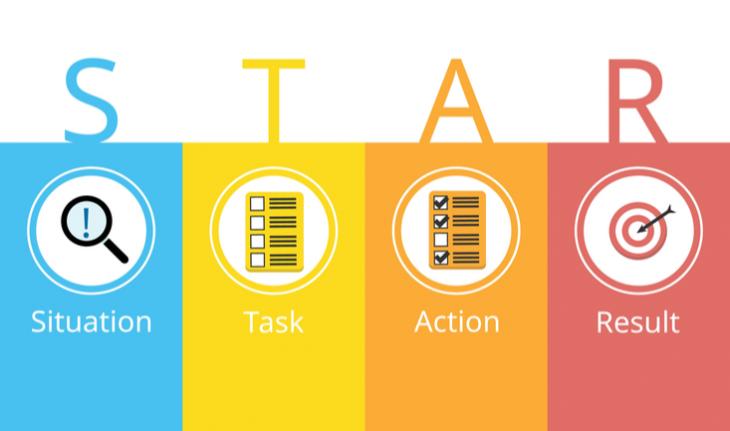
They picked up how I implemented the STAR technique into my answers and how I had a good understanding of the roles and responsibilities the job required. Upon sharing our information amongst each other, it appeared that we all had similar feedback, suggesting that there was a level of awkwardness in having to give critical feedback face to face. I decided to ask my peers what they thought could be better about my interview. They told me that despite the bump I had in the middle, I managed to give really detailed answers. This was a huge confidence boost and reassured me that all the hard work had paid off. The feedback I received has taught me that even though you may be nervous, walking in confident will always leave a good impression. Fake it till you make it! I will also make sure that I work on my storytelling questions in advance by always having at least one lined up so I don’t make the same mistake again where it really counts.
lets recap…
As I draw this blog to a close, I am able to look back fondly on my experiences during my simulated interviews. I thoroughly enjoyed the preparation part as it made the whole journey more relaxed and I felt I have strengthened my time management and organisational skills. I now feel less anxious speaking to others in an interview setting and I do feel like my peers played a huge part in that (go team!). This reflective experience has allowed me to be content with my flaws instead of being self-critical all the time, and that it is totally normal to experience brain fog. After all, you have to make mistakes in life to be able to learn from them. This blog will be great for me to look back on in the future when a job interview inevitably comes up. Just send the worries away and tell yourself, “You’ve got this!”.
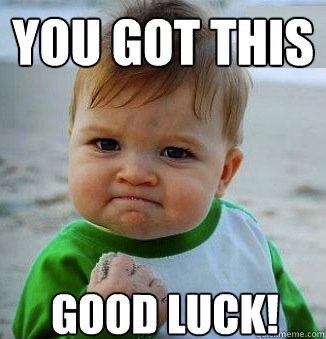
Word Count: 1513
References
[1] Pyle, Nathan W (22 Dec, 2017) – https://www.boredpanda.com/funny-job-interview-comics-nathan-w-pyle/ – (Accessed 3 March 2024)
[2] Martin, Helen (26 Feb, 2021) – https://helendenheld.com/tag/gibbs-reflective-learning-cycle
[3] Job Apply NI (2024) – https://www.jobapplyni.com/Vacancy/VacancyDetail?Id=1592170§or=Education%20and%20Training&listpage=1 – (Accessed 3 March 2024)
[4] O’Neill, C (2024) – Interview Preparation Mind Map – Independent.
[5] Welack, Stefan (21 Oct, 2015) – https://www.linkedin.com/pulse/dont-panic-its-just-interview-stefan-welack – (Accessed 4 March 2024)
[6] Cloke, Harry (21 Sept, 2023) – https://www.growthengineering.co.uk/learning-feedback/ -(Accessed 5 March 2024)
[7] Woodbridge, Amy (27 March, 2014) – https://www.teachaway.com/blog/use-your-teaching-experience-effectively-interviews-star-method – (Accessed 5 March 2024)
[8] Arguella, Stacy (2024) – https://www.pinterest.ph/pin/407435097520230489/ – (Accessed 5 March 2024)
Bibliography
- Barclays Life Skills (2023). “How to Prepare for an Interview | 10 Step Guide | LifeSkills.” Barclays Life Skills, 2023, barclayslifeskills.com/i-want-to-prepare-for-an-interview/school/10-step-guide-to-interview-prep/. [Accessed 7 March. 2024].
- Buchanan, Mike. (2017). Six ways to succeed in teaching interviews | Tes Magazine. [online] www.tes.com. Available at: https://www.tes.com/magazine/archive/six-ways-succeed-teaching-interviews [Accessed 6 Mar. 2024].
- Lonczak, Heather S. (2021). 36 Motivational Interviewing Quotes to Inspire Your Clients. [online] PositivePsychology.com. Available at: https://positivepsychology.com/motivational-interviewing-quotes/. [Accessed 8 Mar. 2024].
- Needle, Flori (2022). “How to Be a Good Interviewer.” Blog.hubspot.com, 20 Sept. 2022, blog.hubspot.com/marketing/how-to-be-a-good-interviewer. [Accessed 6 March. 2024].
- The Muse Editors (2018). “The Ultimate Interview Guide: 30 Prep Tips for Job Interview Success.” Themuse.com, The Muse, 5 Feb. 2018, www.themuse.com/advice/the-ultimate-interview-guide-30-prep-tips-for-job-interview-success. [Accessed 8 March. 2024].
- Walters, Robert (2023). “How to Recover When Thrown by an Interview Question.” Www.robertwalters.com.au, 2023, www.robertwalters.com.au/insights/career-advice/blog/How-to-recover-when-thrown-by-an-interview-question.html. [Accessed 8 Mar. 2024].